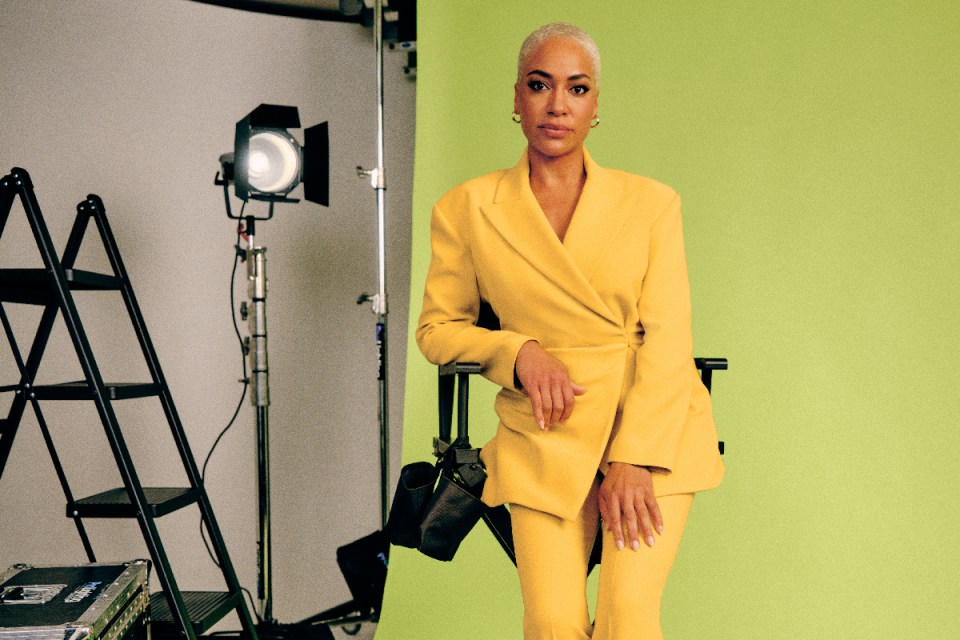Cush Jumbo: On playing Hamlet and choosing which cake to eat
There are two types of people: those who already know about Cush Jumbo, one of the finest British actors of her generation, and those who are soon to find out. The star of wildly successful TV shows including The Good Wife, Criminal Record and Deadwater Fell, Jumbo cemented her A-List credentials when she became the [...]


There are two types of people: those who already know about Cush Jumbo, one of the finest British actors of her generation, and those who are soon to find out.
The star of wildly successful TV shows including The Good Wife, Criminal Record and Deadwater Fell, Jumbo cemented her A-List credentials when she became the first black woman to play Hamlet in a major production at the Young Vic in 2021.
Not content with conquering stage and screen, she recently launched her own podcast, Origins, in which she interviews people she admires about their “Sliding Doors” moments, when their lives could have taken very different paths. Despite it only launching last month, she’s already proven a seasoned journalist’s knack for teasing out stories from her guests. Anna Wintour – a mentor figure to Jumbo – confided that she was once fired from Harper’s Bazaar for being unable to pin a dress, while David Schwimmer gave up a rare Friends exclusive when he admitted his relationship with Matthew Perry wasn’t always as friendly as the show’s title might suggest.
Jumbo arrives early for our interview at Soho’s Dean Street Townhouse. She looks every inch the off-duty actor, clad in denim dungarees but somehow making them look impossibly glamorous. With her trademark short-cropped blonde hair, she’s all crackling energy and megawatt smile; you can see why the New York Times once described her as a “cattle-prod wrapped in cotton candy” (something she says she came to take as a compliment).
Cush Jumbo: I’m sitting here with you so I’m not taking my son to school for his first week. It’s not that I’m having my cake and eating it – I’m choosing which cake to eat.
It’s one of those days in London when it seems the rain will never stop, a thick, grey blanket hanging limply from the sky, Soho’s neon signs reflecting in the puddles on the street. Yet somehow Jumbo looks like she just stepped out of the green room, ready to play the part of Charming Interviewee. Over a leisurely, hour-long lunch she’s engaging and open, happy to weigh in on any subject, speaking with the considered, gentle tone of a primary school teacher.
After quizzing the waiter on the menu’s vegetarian options she settles for a salad with a side of another salad, which makes me feel guilty about the giant curry that arrives on my side of the table. As she tucks into her slightly absurd pile of leaves, I wonder how she finds enough hours in the day to fit everything in.
“It’s hard,” she says matter of factly. “I’ve got a young son so I’m always trying to find a balance. This is why, historically, women have a career early in this business and then they drop off. You have to choose between the two: are you going to be a good parent or are you going to have a career? You can’t do both. It’s completely unrealistic to think you can do everything.”
She scoffs when I suggest she seems to be having her cake and eating it.

“I’m sitting here with you so I’m not taking my son to school for his first week. It’s not that I’m having my cake and eating it – I’m choosing which cake to eat.”
This strikes me as remarkably, unusually honest. Most people lie – to themselves, to others – about the reality of such trade-offs.
“Yeah, it’s hard to admit, particularly as a mum, that you feel guilty for not seeing your kid and choosing work. But I’m not keen on the particularly female thing that gets put out there, especially on social media, that it’s possible to do everything all the time, because it’s absolutely not possible. There are lots of ‘perfect’ mums on social media telling everybody that things are perfect, and I don’t think it’s healthy.”
The daughter of a Nigerian asylum seeker and a psychiatric nurse from Scunthorpe, Jumbo was raised in a block of flats in South London but travelled around a lot as a child. She tells me she went to “six or seven” different schools, which I suggest must have been tough for someone named Cush Jumbo. She laughs: “Yeah, as a kid you just want to feel like everyone else, you want to be called Jane Smith. Now I love it: if a casting director has met me, they know they’ve met me. There is no other Cush Jumbo in the whole world – I checked.”
Cush Jumbo: I must have worked over a hundred jobs in my life. I taught, I waitressed, I cleaned toilets, I did market research, I sold pebble dash on people’s houses, I had a pancake store, I worked at a strip club – as a waitress, not a stripper.
While she says she had a happy childhood, her acting career certainly wasn’t handed to her on a plate. “I don’t come from money, so I’ve always worked really hard. I didn’t leave drama school and get a starring role in a Hollywood movie. I worked three jobs a week to pay the rent. I must have worked over a hundred jobs in my life. I taught, I waitressed, I cleaned toilets, I did market research, I sold pebble dash on people’s houses, I had a pancake store, I worked at a strip club – as a waitress, not a stripper.”
All of this gave her not only a prodigious work ethic but also a knack for making friends, a skill that has come in handy in her new role as journalist extraordinaire on Origins.
“I love talking to people. I’m very nosy. I’m a bit of a chatterbox, and I’ve often been told by other actors that, when we’re on downtime, they end up telling me something they didn’t mean to. I don’t know if that’s because I’m a good listener, or a good talker, or just that I make them feel comfortable. You could call it natural curiosity, or just being bloody nosey, but I’m really interested in people. I want to know what their jigsaw pieces are. I mean, part of my job is the art of studying people. It’s how you find characters. That’s what I do.”
And there is something disarming about Jumbo. I find myself recounting newsroom horror stories from my days as a tabloid reporter and telling her the gory details about interviews gone wrong. I suspect she’s already better at this than I am. Ever the sharer, she responds in kind, telling me about bad experiences she had as a young actor working with more established names.
“To meet someone you admire and just be ignored by them is one thing, because sometimes people are just quiet. But to meet them and to watch them bully people, or treat people badly, or to treat you badly, I find unacceptable, on a human level.”

Is she talking about anyone in particular?
“Yes.”
Care to name and shame?
“No,” she says, flashing a slightly evil grin. “But it makes you realise this is probably what happened to them – you either get really mad about it and decide that’s what you’ll do when you become well known. Or you make sure you never become that person.”
Suffice to say Jumbo chose the latter.
•••
Hamlet is one of the roles for any stage actor, the kind of gig that comes around only when you’re at the very top of your game (and if you’re a woman, it probably never comes around at all). It carries with it an impossible weight of expectation, the burden of history bearing down upon you as you follow in the footsteps of John Gielgud, Laurence Olivier, Richard Burton, Daniel Day-Lewis, Ian McKellan et al. Jumbo was a revelation in the role: utterly magnetic, with a steely deliberateness to the set of her jaw and the slouch of her shoulders.
“It’s a play about mental health, which I’m very passionate about,” she says. “It’s about the coming of age of a boy and it’s a really hard time for boys right now. I love that Shakespeare wrote something that was so futuristic in its understanding, so ahead of its time. Hamlet is born out of time, and he can’t cope.”
She says she studied various types of masculinity, “collecting pictures” of who her Hamlet might be. “Is masculinity about physical strength? Political strength? Is it Boris Johnson or is it Stormzy? Is it a man walking down a catwalk in heels?”
This was not the first time Jumbo had played a traditionally male part, having worked with Phyllida Lloyd in her all-female production of Julius Caesar, in which she took the role of Mark Antony. It makes me wonder if, when director Max Webster approached her to play Lady Macbeth in the just-opened new show at the Harold Pinter Theatre, she didn’t fancy taking David Tennant’s title role instead…
Cush Jumbo: If I turned down a job every time I didn’t agree with the writer, there wouldn’t be much classical theatre for me to do, because most of them weren’t written for people like me.
“Nah, I’ve never wanted to play Macbeth. I have always wanted to play Lady Macbeth though. Shakespeare actually writes her in a really, really masculine way. If you took her name away, she could be a guy. She’d be like an Iago as opposed to a crazy, hysterical woman.”
Jumbo isn’t just breaking down gender barriers but racial ones, too. The British stage looks very different today than it did even a decade ago, with a long overdue drive in Theatreland for blind casting and the foregrounding of black and brown faces. Has the racial legacy of a play or writer or venue ever influenced her decision to take a role?
“If I turned down a job every time I didn’t agree with the writer, there wouldn’t be much classical theatre for me to do, because most of them weren’t written for people like me. And if I was to decide not to act on any stage that had been built by anybody with connections to slave money, I wouldn’t have many theatres to work in.
“I remember playing Eliza Doolittle at the Royal Exchange in Manchester. It was my first lead and I was thrilled to be doing it. I got a bit of flack at the stage door from some people who thought that it was wrong of me to do a classical play there because of the history of the Royal Exchange, and I just didn’t agree. I felt that by playing Eliza Doolittle, I was helping to encourage young people and people of colour and people from different backgrounds to come to the theatre for the first time. Sometimes you have to balance up the good you can do with the past and work out which one is more important.”
It’s the same reason she accepted her OBE from the Queen: “Some people turn it down but I thought there was more good to be done with it. For me it was an amazing honour, and to get it from her shortly before she died was a real privilege.”
Our plates have been cleared and the lunch service has all but cleared out. As we head out into the London rain I ask what the next entry on her CV might be. “Oh, my brain is always having an idea about something else. I don’t like being restricted to boxes.” There’s certainly not much you would put past Cush Jumbo.
• Cush Jumbo will star in Macbeth, now on at the Harold Pinter Theatre; Origins podcast is out now


